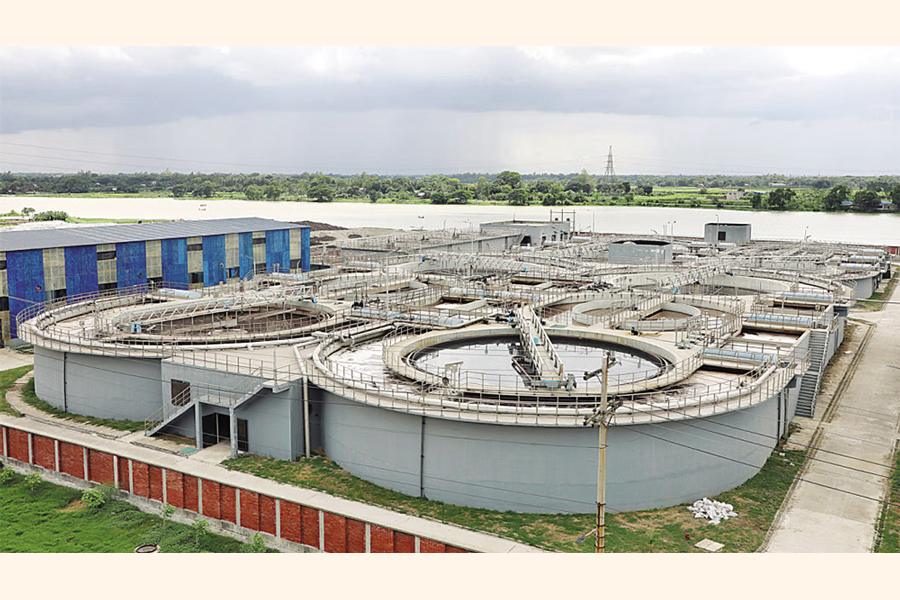Inordinate project time, cost escalations for naught
Now IMED finds Savar leather park faultlines
Bangladesh misses huge forex for failing to qualify for high-value western market following project fiasco

Published :
Updated :

A government watchdog has dug out an epitome of operational, environmental, and governance "failures" in a vital project that continue to undermine Bangladesh's leather sector and its global competitiveness, thereby causing the country to miss millions in foreign exchange.
On such a discovery of fiascos, the Implementation Monitoring and Evaluation Division (IMED) has strongly criticized the performance of the Leather Industrial Park in Savar.
The project, executed at 5.34 times its original budget and 6.17 times the planned timeline, failed to bring the Central Effluent Treatment Plant (CETP) up to international standards and could not even comply with the government's own Department of Environment requirements, according to an IMED inspection report.
The CETP's inadequate capacity is preventing industrial units from obtaining Leather Working Group (LWG) certification, forcing them to export products to low-cost markets like China instead of 50-60-percent higher-value markets in the European Union, the USA, Australia, Russia, and other countries, according to the report.
Experts and industry insiders say despite global -standard infrastructure, a large number of leather factories have yet to receive LWG certificate, which leads to an annual loss of over $500 million in Bangladesh.
The inability to achieve LWG certification has not only eroded Bangladesh's foreign-exchange earnings but also tarnished the country's reputation as a reliable supplier of environmentally compliant leather products, they add.
Planning Commission officials say the project, initially approved at an estimated cost of Tk 1.76 billion in 2003-2005 to establish an environment-friendly leather park in Savar and relocate over there tanneries scattered across Hazaribagh at the heart of Dhaka city, was originally scheduled for three years.
However, the project of the Bangladesh Small and Cottage Industries Corporation (BSCIC) under the ministry of industries completed in June 2021 after long 18.5 years, with the final cost ballooning to Tk 9.38 billion.
The IMED conducted an inspection to assess the project's progress and outcomes, only to its surprise over the fundings.
The report reveals that the effluent samples collected by IMED and the Department of Environment show total suspended solids, chromium, biochemical-oxygen demand, and chloride levels far exceeding permissible limits, creating severe risks for rivers and surrounding communities.
Governance weaknesses have exacerbated operational failures, with seventeen project directors appointed over eighteen years, twelve of whom served on a part-time basis, causing continuity and supervision to remain critically weak.
The probe finds that the High Court directives issued in 2017 to ensure proper wastewater treatment and environmental safeguards have largely gone unimplemented, with project management failing to enforce compliance across estate-based tanneries.
The project-implementation -monitoring agency also has observed structural flaws in the CETP compound, including cracks in roof slabs, exposed reinforcement in cable drains, insufficient waterproofing, and substandard casting, reflecting poor construction oversights.
"Tannery operators' excessive water use continues to overwhelm the limited capacity of the CETP, while the absence of essential service institutions such as banks, insurance offices, and postal units further hampers daily business operations," the report reads.
Despite relocating 155 tanneries from Hazaribagh and developing basic infrastructures such as roads, drains, and dumping yards for solid waste, the project has failed to establish an environmentally compliant leather cluster capable of securing global certifications.
The IMED review warns that unless the Ministry of Industries immediately operationalise the CETP, enforces environmental regulations, and ensures rapid LWG certification, Bangladesh will continue losing competitiveness in premium leather markets.
Industry experts describe the Savar project as a classic example of mismanaged industrial development, where enormous investment and extended timelines have failed to deliver environmental safeguards, global certification, or export competitiveness.
Without immediate corrective measures, the evaluation report cautions, environmental hazards, reputational risks, and opportunity losses for leather exporters are likely to escalate, undermining long-term investor confidence in the sector.
jahid.rn@gmail.com


 For all latest news, follow The Financial Express Google News channel.
For all latest news, follow The Financial Express Google News channel.